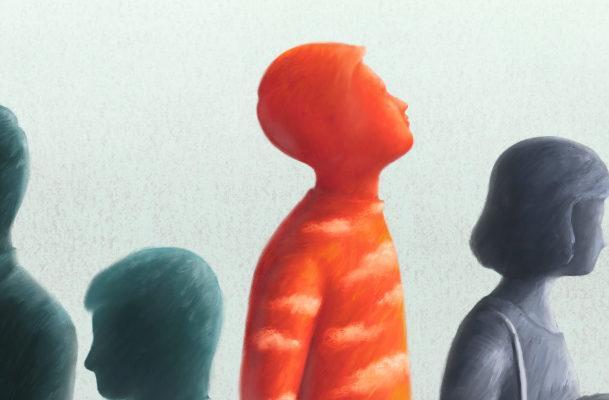Featured
Tending the Family Tree: Intervening in Intergenerational Mental Health
Every step forward offers an opportunity for the next branch on the family tree to be a healthier and happier one.

Unaddressed mental health concerns can echo through the generations of a family, but the exact path depression, anxiety, and other disorders may take through the branches of a family tree isn’t always straightforward.
The children of parents with depression, for example, are upwards of three times more likely to become depressed themselves as adolescents. However, this relationship can flow both ways, according to research reported by Julianne M. Griffith (University of Illinois at Urbana-Champaign) and colleagues in a 2021 Clinical Psychological Science article.
Many mental health conditions, including depression, can be passed from parent to child through genetic risk factors, Griffith and colleagues explained. According to the transactional model of depression, parents and children can also be influenced by one another’s moment-to-moment emotional fluctuations, with the tendency toward depression becoming more stable and trait-like over time.
“It may be, for example, that children’s levels of depression at a given point in time are related to their parents’ recent expressions of negative emotions or modeling of depressive cognitive styles,” Griffith said in an interview with the Observer. “Over time, however, it may be that more stable individual-difference factors, such as exposure to contextual risk factors like family adversity or chronic life stress, play a greater role in the association between parent and adolescent depression.”
In two studies following a total of 817 parent–child pairs over a period of 2 to 3 years, Griffith and colleagues found that parents’ and children’s symptoms of depression tended to change together, rather than in reaction to one another. Large fluctuations in a parent’s or child’s symptoms, however, did not necessarily cause a similar increase in their family member’s symptoms 3 months later.
Put more simply, Griffith explained, parents with more symptoms of depression were likely to have children who also had more symptoms. The severity of most participants’ depression tended to hover around a certain average over time, regardless of large swings in their family members’ well-being.
“The pattern of results observed in these studies suggests that various risk mechanisms may be differentially relevant to parent and youth risk for depression based on the timescale of interest,” Griffith said. “Knowing how timescale and within- and/or between-dyad associations affect depression levels in parents and their children can help us better understand the various mechanisms of intergenerational risk transmission.”
How stress and sadness impact the brain
Intergenerational risk for developing depression may be reflected in the brain activity of children with a family history of the condition before they even experience symptoms themselves, wrote Pan Liu (Western University) and colleagues in a 2021 Clinical Psychological Science article.
Through analyzing functional connectivity in the brains of 87 children without clinically significant symptoms of depression when they were 3 and 11 years old, Liu and colleagues found that higher-risk children with maternal histories of depression or anxiety had altered functional connectivity between areas of the brain associated with processing negative emotion.
When these children watched a sad movie clip (specifically, a boy’s beloved horse drowning in The NeverEnding Story), functional MRI (fMRI) revealed more synchronized activity between the medial prefrontal cortex (mPFC) and the posterior cingulate cortex (PCC), as well as a reduction in synchronized activity between the mPFC, insula, and amygdala.
Activity in the insula and amygdala are associated with monitoring relevance and generating an immediate reaction to stimuli, Liu and colleagues explained. The mPFC, on the other hand, enables emotion evaluation and expression, while the PCC supports switching between internal and external attention. Functional connectivity between the mPFC and PCC is associated with introspection, the researchers added, so an increase in this activity in young children could be an early indicator of risk for the heightened negative self-focus and rumination characteristic of depression.
“Maladaptive patterns of brain connectivity, particularly during negative mood states, may serve as an important pathway to depression, given that such patterns mark difficulties in down-regulating or recovering from negative mood,” Liu and colleagues wrote.
It’s worth noting, however, that children’s sadness at age 3—as evaluated through a series of temperament tasks, including their reaction to unwrapping an empty gift box and seeing a jumping spider toy—was associated with altered functional connectivity in all of these areas, but only when the child’s family had experienced significant relational and financial stress. This suggests that although maternal depression may serve as a risk factor for altered brain activity, this risk factor may not be fully activated in environments that are more emotionally and financially secure, the researchers wrote.
Can mental illness skip a generation?
Although depression has a clear intergenerational component, there remains a common belief that traits can “skip a generation.” Most discussions of the topic tend to focus on concepts like courage and talent. Research by Allison Shields (Northwestern University) and colleagues suggests that there may be some truth to these beliefs when it comes to mental health as well.
“High levels of personality pathology in grandparents can still confer risk for psychopathology in grandchildren, even if the grandchild’s parents are well-adjusted,” Shields said in an interview with the Observer.
Shields’s and colleagues’ 2021 Clinical Psychological Science study evaluated the mental health of 180 older adults, their 218 adult children, and their 337 grandchildren through clinical interviews and age-appropriate measures of internalizing and externalizing personality disorders.
Internalizing personality disorders, such as paranoid personality disorder, obsessive-compulsive disorder, and borderline personality disorder, tend to be more inwardly focused, the researchers explained. These disorders may also involve different degrees of depression, anxiety, and social detachment. Personality disorders with strong externalizing symptoms, on the other hand, tend to involve more outwardly focused social antagonism and disinhibition, as with narcissistic and antisocial personality disorders.
By comparing the results of all three generations of a family, Shields and colleagues found that grandparents with symptoms of a personality disorder were more likely to have children and grandchildren with symptoms of a disorder as well. This risk was general rather than disorder-specific, however. This means that, although the children and grandchildren of an adult with symptoms of a mental health condition were more likely to also have symptoms of a condition, it wasn’t necessarily the same condition.
In fact, grandparents with more internalizing symptoms were likelier to have grandchildren with externalizing symptoms. Grandparents with externalizing symptoms, however, were not likelier to have grandchildren with internalizing symptoms.
“Personality pathology reverberates across generations, and this is most visible when looking at broad-spectrum indicators rather than unique disorder-specific transmission,” Shields said. “These domain-specific findings raise the possibility that traits related to social avoidance and negative emotions set the stage for more overt behavioral problems across generations, potentially because these traits in upstream generations could result in problematic and unsupportive parent–child relationships.”
This theory was not directly tested in this study, however, Shields noted, underscoring the need for future multigenerational family studies that examine a broad range of psychopathology. Additional studies could also help untangle the complex relationships between psychosocial, behavioral, and biological risk factors that may amplify or alleviate mental health conditions across generations, Shields said.
How parenting practices can protect against depression
Authoritative parenting may support healthy brain development
The children of parents with depression may be at increased risk of developing depression themselves, but that doesn’t mean it’s inevitable. Numerous studies have found that warm, supportive parenting practices could help protect against existing depression risk, including one 2014 study by Autumn Kujawa (Stony Brook University) and colleagues in Clinical Psychological Science.
At the start of the study, the researchers observed how 344 mothers interacted with their 3-year-old children during a series of teaching tasks such as reading a book or building with blocks. The mothers, and fathers when available, were also assessed for current and lifetime histories of depression and self-reported their parenting practices at home.
Listen to this Under the Cortex mini episode on investigating complex brain processes with Oriel FeldmanHall.
Six years later at age 9, the children completed a monetary reward task while electroencephalography (EEG) monitored their brain activity related to reward processing. Children of parents with a history of depression were found to have a “blunted” neural response to making a correct versus incorrect choice in the task.
This reduced sensitivity to rewards, a cognitive trait associated with depression, was not found, however, in children whose mothers were depressed but self-reported or were observed to have a more authoritative parenting style characterized by confident control, emotional support, and warmth.
This suggests that, compared to low-warmth authoritarian parenting or low-control permissive parenting, high-warmth, high-control authoritative parenting may help limit the effects of parental depression on brain development, Kujawa and colleagues wrote.
“Children at risk for depression may benefit from interventions designed to increase positive parenting behaviors, and this could be a potentially effective early intervention or prevention approach,” the researchers concluded.
Anger and aggression might put adolescents at risk
Parenting style can also influence whether a child with heightened risk for depression goes on to develop symptoms of the condition in adolescence, Orli S. Schwartz (University of Melbourne) and colleagues found in a 2013 Clinical Psychological Science study. Schwartz’s study followed 160 adolescents and their parents over a period of 6 years. The adolescent participants, who began the study at age 12 without past or current diagnoses of depression, completed a temperament questionnaire and were selected to equally represent youth with low, medium, and high risk of developing depression later in life.
At the beginning of the study, children collaborated on two tasks with a parent: planning an outing based on their shared interests and discussing an ongoing issue in their relationship. Children were then reassessed for depression three times over the next 6 years.
Relevant Research Topics
-

Aggression and Violence
For psychological scientists, exploring the less pleasant aspects of individual and social nature, like violence and aggression, is an occasional necessity. Visit Page
-

Mental Health
Psychological scientists have amassed a vast amount of empirical knowledge on the causes of and best treatments for mental disorders. Visit Page
-

Family Relationships
APS offers some scientific insights into family dynamics. Visit Page
Children whose mothers reacted anxiously to their positive or aggressive behavior during the tasks were more likely to develop depression by the time they were 19.
The effects of maternal aggression, including anger, contempt, and argumentativeness, were also found to vary based on the child’s gender. Girls were more likely to develop depression if their mothers reciprocated their aggressive behavior, possibly because this dynamic could reflect a more conflicted mother–daughter relationship, Shwartz and colleagues wrote. Boys, on the other hand, were more likely to develop depression if their mothers backed down in response to aggressive behavior—possibly because this could reinforce the child’s tendency to direct anger at others.
As in many other studies related to parenting, Schwartz and colleagues were not able to analyze the effects of paternal behavior because of the low number of fathers who participated in the study. Still, the maternal behavior observed in this research may be reflective of the larger, day-to-day social dynamics of a family, Schwartz and colleagues suggested.
“The way young people are socialized in relation to their anger and, thus, how they learn to regulate their anger may be particularly important for the development of depression across adolescence,” Schwartz and colleagues explained. “In particular, maternal dampening of adolescent positivity, or the failure to appropriately reinforce positivity, may be associated with difficulty upregulating positive emotion, which may create vulnerability to depression, particularly in relation to the anhedonic features of this disorder.”
Research on parenting styles and depression often focuses on identifying risk factors rather than protective benefits, the researchers noted, but even outwardly negative findings suggest avenues for intervention. Offering emotion coaching to parents, for example, could help protect adolescents against developing depression and other mental health conditions by teaching families to communicate more positively, Schwartz and colleagues wrote.
Disrupting the link between depression and drug use
Emotionally supportive parenting may also help limit the downstream effects of depression resulting from experiences of discrimination, wrote Tamika C. B. Zapolski (Indiana University–Purdue University Indianapolis) in a 2016 Clinical Psychological Science article.
Previous research has established a link between racial discrimination, depression, and drug use among Black adolescents, Zapolski and colleagues explained. Through a study of 1,521 Black youths in Grades 4 through 12, the researchers found further evidence of this relationship: Children who reported being teased about their race in the past year scored higher for depression and were likelier to report having used any kind of drug recreationally in the past 30 days.
This mediational pathway could be disrupted, however, by parental support, the researchers wrote. In this case, children who reported that their parents listened to them and enjoyed spending time with them were no less likely to become depressed as a result of racial discrimination, but they were less likely to use drugs in response to feeling depressed.
“In addition to teaching youth coping skills to manage their mood, aiding parents in supportive parenting techniques can provide additional buffers for drug use vulnerability by providing additional emotional support networks for the youth and outlets to learn additional coping skills,” Zapolski and colleagues concluded.
Alleviating anxiety with supportive parenting
Social anxiety disorder and childhood maltreatment
Depression isn’t the only mental health condition for which parenting practices can become a risk factor. People with social anxiety disorder (SAD) have an intense fear of being rejected by family, friends, and acquaintances—and those who experienced emotional abuse and neglect as children are often most severely affected, wrote Anat Talmon (Stanford University) and colleagues in a 2021 Clinical Psychological Science article.
“Childhood emotional trauma may significantly affect an individual’s emerging self-concept and may bias learning such that negative feedback from others becomes more salient than positive feedback—a pattern observed in SAD,” Talmon and colleagues explained. “This may create a perpetuating effect, leading to a predominantly negative self-concept.”
The researchers analyzed the relationship between early life experiences and SAD severity in two studies by pairing survey data with fMRI of 269 participants’ default-mode networks (DMNs). Patients with SAD who reported more negative self-beliefs were found to have higher DMN activation during negative self-judgments. They also reported more emotional abuse and neglect during their childhood than those with more positive self-beliefs.
Learn more about Talmon and colleagues’ research on social anxiety disorder.
“Considering the patterns of self-referential processing and childhood experiences may be informative about the type of treatment that could be most beneficial for different people who share the same clinical diagnosis on the basis of their classically defined symptoms,” Talmon and colleagues wrote.
Patients with SAD who experienced emotional abuse or neglect as children may be able to dampen emotional reactivity related to this trauma using mindfulness/acceptance-based therapies, the researchers suggested. For patients without a history of emotional maltreatment, cognitive behavioral therapy (CBT) may provide a valuable avenue for developing the cognitive skills needed to challenge negative self-beliefs.
Research on what role parents may have to play in CBT for children with anxiety is mixed, however, wrote Wendy K. Silverman (Yale University School of Medicine) and colleagues in a different 2021 Clinical Psychological Science article. This means that it’s not enough for parents just to be involved. In order for parent-supported CBT to be effective, the intervention needs to target specific parenting practices related to anxiety.
Relinquishing psychological control
In a 2019 Clinical Psychological Science study of 240 young people ages 7 to 16 with an anxiety disorder, Silverman and colleagues found that participants who received at least 12 weeks of parent- or peer-supported CBT reported an equal reduction in symptoms. Mediational analyses of patients’ anxiety levels before treatment, upon completion of the CBT intervention, and 12 months afterward suggest that these results may have been achieved through different pathways.
Peer-based group CBT brought together groups of two to three young people with the same anxiety diagnosis, including SAD, generalized anxiety disorder, and specific phobias, to build relationships during sessions that exposed them to social situations, dogs, and other stressors. Group CBT was found to reduce anxiety through building positive relationships with patients’ peers.
In parent-involved cognitive behavioral therapy, parents were present for the same anxiety-exposure sessions. Children and their parents also worked with a therapist to identify strategies for addressing conflict within their relationship. PCBT was found to reduce anxiety by reducing patients’ perception that their parent was trying to psychologically control them, such as through guilting or withdrawing affection in order to control their behavior.
“Our findings suggest clinicians may have flexibility and achieve similar anxiety reduction outcomes by targeting peer interactions in [group-based CBT] and parental psychological control in [parent-involved CBT],” Silverman and colleagues wrote. “Similarly, addressing both of these mechanisms in the same intervention may result in additively superior effects than either one alone.”
Reinforcing opportunities for exposure
Silverman and colleagues further examined how parents can best support their children through CBT in a 2021 study of 341 patients, also published in Clinical Psychological Science. Participants ages 7 to 16 were diagnosed with a similar variety of anxiety disorders and evaluated for anxiety severity before, immediately after, and 12 months after receiving an average of 11 sessions of CBT.
This time, patients were split into three groups. All received standard CBT for anxiety, but in two experimental groups, the patients’ parents were also trained on either relationship or reinforcement skills. In the relationship condition, parents focused on learning to more effectively express approval of their child’s behavior; in the reinforcement condition, they focused on learning to encourage children to confront anxiety-inducing situations.
Immediately after treatment, children who received either form of parent-involved CBT reported a greater reduction in anxiety than those in the control group. Parents who were involved in CBT also rated their children as less anxious. Although all forms of CBT were found to reduce anxiety equally at the 12-month follow-up, the early dip in anxiety symptoms suggests that offering skill training to parents could help improve treatment outcomes, Silverman and colleagues wrote.
The researchers approached parent-involved CBT from different directions, but both forms, they explained, may ultimately encourage children to increase their exposure to anxiety-inducing situations, a critical component of CBT. This increased exposure has been shown to reduce anxiety in the long term by providing patients with an opportunity to learn that they can handle stressful situations by practicing coping skills in the real world.
Research on exactly how parents can best contribute to treatment continues to develop, but every step forward offers an opportunity for the next branch on the family tree to be a healthier and happier one.
“Even subclinical levels of personality pathology in upstream generations can have deleterious consequences for future generations,” said Shields in explaining how her and other researchers’ findings could help to improve families’ mental health outcomes. “It will be crucial for future research to identify the mechanisms of this intergenerational transmission and to investigate factors that exacerbate risk or, conversely, increase resiliency in individuals at high risk for psychological problems.”
Feedback on this article? Email apsobserver@psychologicalscience.org or log in to comment.
References
Griffith, J. M., Young, J. F., & Hankin, B. L. (2021). Longitudinal coupling of depression in parent–adolescent dyads: Within- and between-dyads effects over time. Clinical Psychological Science, 9(6), 1059–1079. https://doi.org/10.1177/2167702621998313
Kujawa, A., Proudfit, G. H., Laptook, R., & Klein, D. N. (2015). Early parenting moderates the association between parental depression and neural reactivity to rewards and losses in offspring. Clinical Psychological Science, 3(4), 503–515. https://doi.org/10.1177/2167702614542464
Liu, P., Vandermeer, M. R. J., Mohamed Ali, O., Daoust, A. R., Joanisse, M. F., Barch, D. M., & Hayden, E. P. (2022). Maternal depression, child temperament, and early-life stress predict never-depressed preadolescents’ functional connectivity during a negative-mood induction. Clinical Psychological Science, 10(1), 141–160. https://doi.org/10.1177/21677026211016419
Schwartz, O. S., Byrne, M. L., Simmons, J. G., Whittle, S., Dudgeon, P., Yap, M. B. H., Sheeber, L. B., & Allen, N. B. (2014). Parenting during early adolescence and adolescent-onset major depression: A 6-year prospective longitudinal study. Clinical Psychological Science, 2(3), 272–286. https://doi.org/10.1177/2167702613505531
Shields, A. N., Oltmanns, T. F., Boudreaux, M. J., Paul, S. E., Bogdan, R., & Tackett, J. L. (2021). The impact of personality pathology across three generations: Evidence from the St. Louis Personality and Intergenerational Network study. Clinical Psychological Science, 9(5), 900–918. https://doi.org/10.1177/2167702621989665
Silverman, W. K., Marin, C. E., Rey, Y., Kurtines, W. M., Jaccard, J., & Pettit, J. W. (2019). Group- versus parent-involvement CBT for childhood anxiety disorders: Treatment specificity and long-term recovery mediation. Clinical Psychological Science, 7(4), 840–855. https://doi.org/10.1177/2167702619830404
Silverman, W. K., Rey, Y., Marin, C. E., Jaccard, J., & Pettit, J. W. (2022). Does training parents in reinforcement skills or relationship skills enhance individual youths’ cognitive behavioral therapy for anxiety? Outcome, specificity, and mediation. Clinical Psychological Science, 10(2), 355–373. https://doi.org/10.1177/21677026211016402
Talmon, A., Dixon, M. L., Goldin, P. R., Heimberg, R. G., & Gross, J. J. (2021). Neurocognitive heterogeneity in social anxiety disorder: The role of self-referential processing and childhood maltreatment. Clinical Psychological Science, 9(6), 1045–1058. https://doi.org/10.1177/21677026211004452
Zapolski, T. C. B., Fisher, S., Hsu, W.-W., & Barnes, J. (2016). What can parents do? Examining the role of parental support on the negative relationship among racial discrimination, depression, and drug use among African American youth. Clinical Psychological Science, 4(4), 718–731. https://doi.org/10.1177/2167702616646371





APS regularly opens certain online articles for discussion on our website. Effective February 2021, you must be a logged-in APS member to post comments. By posting a comment, you agree to our Community Guidelines and the display of your profile information, including your name and affiliation. Any opinions, findings, conclusions, or recommendations present in article comments are those of the writers and do not necessarily reflect the views of APS or the article’s author. For more information, please see our Community Guidelines.
Please login with your APS account to comment.